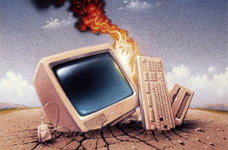|

Tips & Tricks - Make sure your
PC is crash resistant
by Mario A. Williams III
The last
thing a small business owner needs is computer trouble,
especially during peak business hours (or season). Here is
a scenario a colleague of mine ran into for a small retail
business during the holiday season.
While
closing out of business, she heard a clicking sound, but didnít
think much of it. The next morning while starting the PC, the
computer would not start up. She raced the computer to my home
office, Saturday evening, where I quickly diagnosed a
hard-drive crash. Well, I couldnít obtain an inexpensive
replacement so I went to one of those electronic outlets.
To make a
long story short, after purchasing a replacement, her repair
bill topped $300 and we still couldnít retrieve her data. Iíve
been in the computer industry for many years, Iíve come to
understand that
three
things are guaranteed:
death, taxes
and a hard-drive failure.
With that in mind, hereís
four ways not to make the
same mistake:
-
Develop a strategy.
First, determine what information you can't afford to lose.
For most small businesses, that's almost everything. At the
least, you'll want to make regular copies of your accounting
files. If you don't have a lot of daily transactions, then
back up your information once a week. It's important to make
it a habit.
-
Tools of the
Trade
Until recently, most people
backed up information by copying important files to a floppy
disk. These days, there are faster, more reliable methods.
One of the best inexpensive approaches is to backup your data
to a compact disk. For this, you'll need a CD-Rewritable
(CD-RW) drive, the same device people use to "burn" CDs of new
tunes from the internet. These disk store as much as 700
megabytes of data, far more than a floppy disk will hold and
plenty to store one person's files and e-mail. If you're
running a business with three or more workstations, it will be
more efficient to use a drive that stores data on tape rather
than on CD.
Whatever hardware you choose, make sure you use software that
allows you to schedule automatic backups at regular intervals
and store you backups away from the office - ideally someplace
easily accessible and work-ready.
NOTE: Stay tune for
next issue
for an article on Disaster Recovery...
-
Resist the Surge
To supplement your backup strategy, make sure you're
protected from on the biggest threats to computer data - power
surges. They're often caused by lightning, which can send
damaging high voltage screaming through power, cable, or
digital subscriber lines (DSL) into your computer. If you're
hit, don't expect that $7 power strip to totally protect you.
You'll need to purchase a business-grade power and data line
surge suppressor, available at most office-supply stores for
about $30.
-
Safe or Sorry
If you have no backups and your computer is fried by a
power spike, there's no need to worry about your online
backing transactions, however. Like all banks, they keep
their own backup records of your activity. But you can spare
yourself the unnecessary computer-related angst when it comes
to your own materials - it's easy enough to defend your data.
Back
NOTE:
None of these suggestions and/or product names where endorsed by
the manufacturer listed above. The opinion expressed here is an
independent suggestion to handling the above mentioned question.
.jpg) |